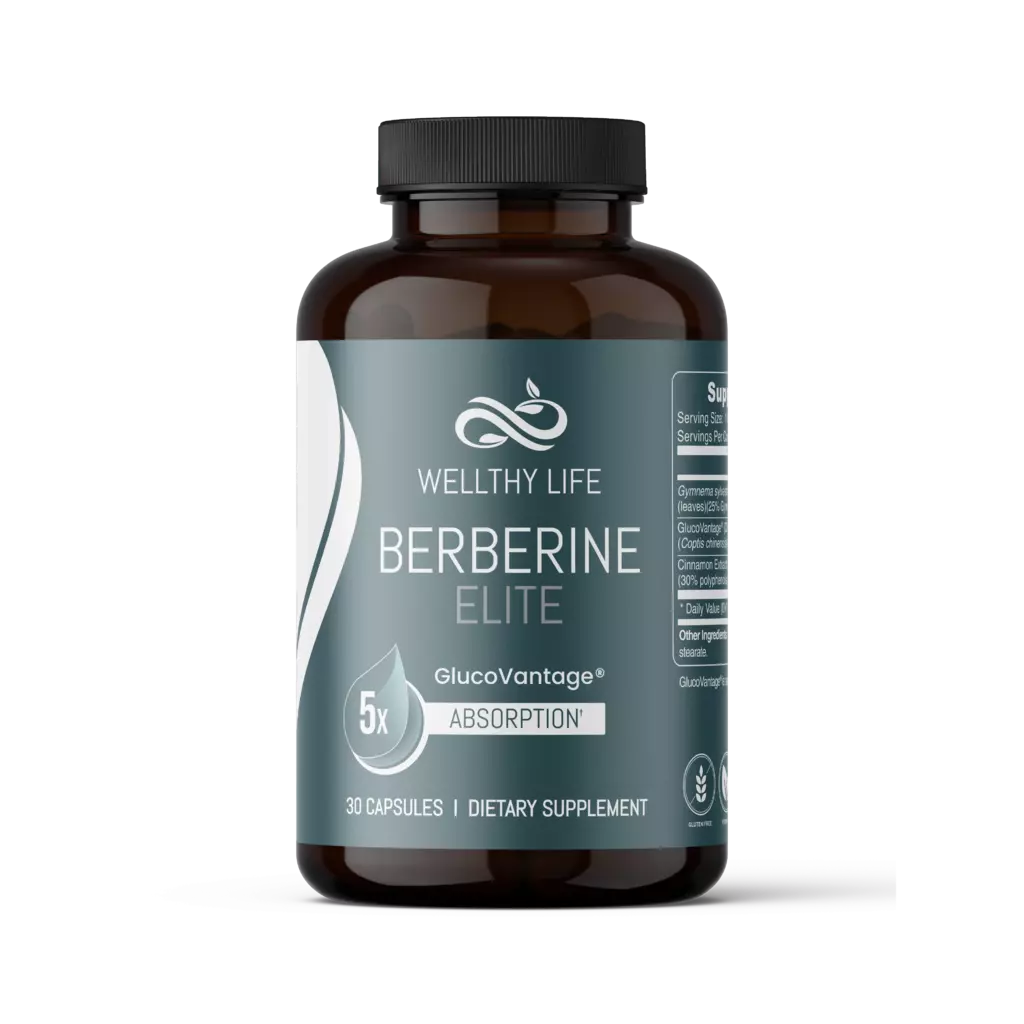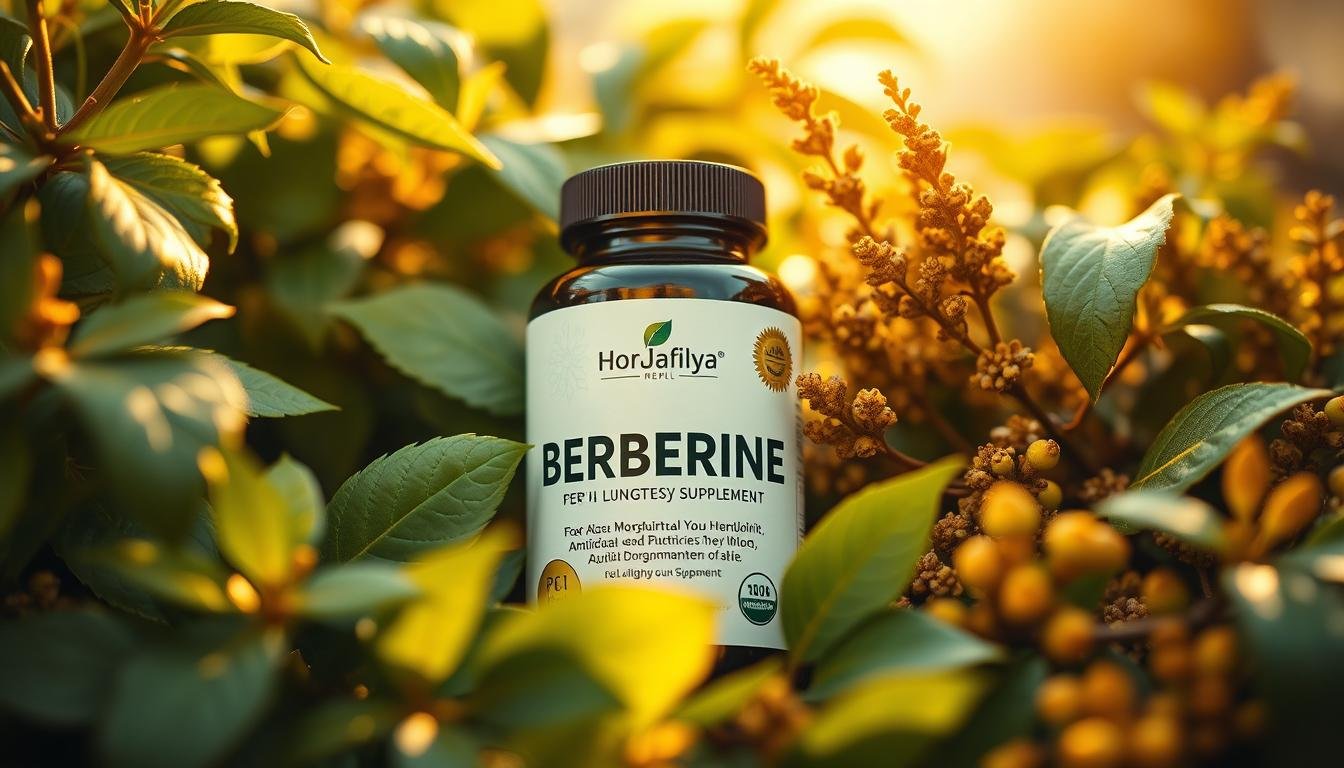Berberine is a plant-based compound used for over 3,000 years in traditional medicine. It’s found in China, South Asia, and Europe. Modern researchers are looking into its benefits for diabetes, high cholesterol, and PCOS. Berberine Elite is seen as a natural wellness solution because it affects enzymes in DNA, RNA, and cells.
Key Takeaways
- Berberine has a long history in traditional medicine, dating back over 3,000 years.
- Modern research is exploring Berberine Elite’s potential benefits for blood sugar balance, metabolic support, and weight management.
- Berberine Elite may help protect the gut, reduce inflammation, and support brain health.
- Berberine supplements are available over-the-counter and should be used with healthcare provider guidance.
- Berberine Elite has demonstrated promising effects on cholesterol, blood pressure, and insulin sensitivity.

Understanding Berberine: History and Natural Sources
Berberine is a powerful compound from plants, with a history over 3,000 years old. It comes from ancient Chinese and South Asian medicine. This plant-based medicine is known for treating infections and soothing many ailments.
Ancient Origins and Traditional Uses
Berberine’s use goes back to ancient times. It was found in plants like European barberry and Oregon grape. These plants were used in traditional Chinese and Ayurvedic medicine for many health issues.
Plant Sources of Berberine
Berberine is found in the roots and bark of these plants. European barberry fruit has about 5.5-7.7% berberine. Other compounds in barberry plants also have health benefits.
Modern Scientific Discovery
Recent research has shown berberine’s potential in modern health challenges. It helps with metabolic disorders and protects the heart. Berberine is now used in natural supplements for integrative medicine.
How Berberine Elite Works in Your Body
Berberine, the main ingredient in Berberine Elite, is very powerful. It supports your metabolic health in many ways. At the cellular level, it activates a key energy-sensing system called AMP-activated protein kinase (AMPK).
This activation of AMPK has big effects. It helps control glucose and lipid metabolism. It also improves insulin sensitivity and boosts mitochondrial function.
Berberine works as an α-glucosidase inhibitor. This means it slows down the digestion and absorption of carbs in your intestines. It helps prevent blood sugar spikes after meals.
Also, berberine increases the expression of LDL receptors in the liver. This leads to better lipid metabolism. It reduces cholesterol and triglyceride synthesis.
| Mechanism of Action | Effect |
|---|---|
| AMPK Activation | Regulates glucose and lipid metabolism, improves insulin sensitivity, enhances mitochondrial function |
| α-Glucosidase Inhibition | Slows down carbohydrate absorption, helps prevent blood sugar spikes |
| Induction of LDL Receptors | Improves lipid metabolism, reduces cholesterol and triglyceride synthesis |
Berberine uses many ways to support your metabolic health. It can help manage blood sugar, improve lipid profiles, and boost energy-sensing capabilities. Adding Berberine Elite to your wellness routine can be very beneficial.
Blood Sugar Management and Metabolic Benefits
Berberine is a natural compound found in plants. It’s known for its ability to control blood sugar and boost metabolic health. Its effects on insulin sensitivity and glucose metabolism have caught the eye of scientists and health enthusiasts.
Insulin Sensitivity Enhancement
Research shows berberine boosts insulin sensitivity. This is key for managing blood sugar levels. It makes the body better at using insulin, helping control glucose levels.
This effect has been seen in both animal studies and human trials. Berberine is seen as a natural way to manage blood sugar.
Glucose Metabolism Regulation
Berberine also affects glucose metabolism. It helps the body take up and use glucose better. This keeps blood sugar levels healthy.
It does this by influencing genes involved in glucose use and reducing liver glucose production. This makes berberine useful for managing metabolic disorders.
Comparison with Traditional Medications
Berberine’s effects on blood sugar are similar to metformin, a common diabetes drug. But berberine might be more effective and has fewer side effects. This makes it a good natural option for managing blood sugar and metabolic health.
| Parameter | Berberine | Metformin |
|---|---|---|
| Fasting Blood Glucose Reduction | 1.5-2.2 mmol/L | 1.0-2.0 mmol/L |
| HbA1c Reduction | 0.9-2.0% | 1.0-2.0% |
| Mechanism of Action | Enhances insulin sensitivity, regulates glucose metabolism | Reduces hepatic glucose production, improves insulin sensitivity |
| Side Effects | Generally well-tolerated, rare gastrointestinal discomfort | Gastrointestinal side effects (nausea, diarrhea), lactic acidosis risk |
Weight Management and Fat Loss Properties
If you’re having trouble with weight loss or want to reduce body fat, berberine might help. Studies show it can manage obesity by changing how the body handles fats. It might also stop fat from building up.
Research says berberine can lower your body mass index (BMI) and help with weight loss. It can also shrink your waist and improve your body shape. This makes it a good choice for those looking to reduce fat and get in shape.
But, we need more solid research to really know how berberine works on weight management compared to drugs like Ozempic. Even though the early signs are good, always talk to a doctor before adding berberine to your obesity management plan.
Cardiovascular Health Benefits and Cholesterol Control
Berberine is a natural compound found in plants. It’s great for heart health and controlling cholesterol. It also helps manage blood sugar levels.
Impact on Blood Pressure
Research shows berberine can lower blood pressure. It improves blood vessel function and reduces inflammation. This helps keep the heart healthy and may prevent heart disease.
Lipid Profile Improvement
Berberine is good for your lipid profile. It lowers bad cholesterol and triglycerides. At the same time, it raises good cholesterol. This can lower heart disease risk.
Heart Health Support
Berberine does more than just lower blood pressure and cholesterol. It also improves blood vessel function. Its anti-inflammatory effects may lower heart disease risk.
Berberine is a key part of a heart-healthy plan. It tackles many risk factors. This natural compound supports overall heart health.
| Cardiovascular Health Metric | Impact of Berberine |
|---|---|
| Blood Pressure | Reduces both systolic and diastolic blood pressure |
| Lipid Profile | Lowers total cholesterol, LDL cholesterol, and triglycerides; increases HDL cholesterol |
| Endothelial Function | Improves endothelial function and reduces inflammation in the cardiovascular system |
| Heart Disease Risk | Contributes to the prevention of cardiovascular diseases |

Berberine Elite: A Comprehensive Review of its Benefits
Berberine is a natural compound found in plants. It’s known for its health benefits. Berberine Elite is a top-notch supplement that offers many advantages for your health.
It helps with blood sugar control. Studies show it can lower blood sugar levels like some diabetes drugs. But, it doesn’t have the same side effects.
It also supports heart health. Berberine Elite can improve blood pressure and lipid levels. This makes it great for heart health.
It’s good for your gut too. Berberine Elite fights inflammation and supports a healthy gut. This can help with digestion and overall gut health.
It has antioxidant and anti-inflammatory effects. These properties protect cells and reduce inflammation. This can help with many health issues.
It may also help with weight management. Berberine Elite can affect insulin sensitivity and fat cell growth. It’s a good choice for those trying to lose or maintain weight.
Overall, Berberine Elite is a natural way to boost your health. But, always talk to a doctor before starting any new supplement.
Gut Health and Digestive System Impact
Berberine is a plant-based compound that greatly benefits gut health and digestion. It protects the gut from inflammation and boosts good bacteria. This leads to a healthier gut microbiome. Its ability to fight off bad bacteria also helps.
Studies show berberine’s positive effects on digestion. In one study, it helped rats with stomach ulcers heal faster. It reduced stomach inflammation and stress. Another study found it improved symptoms in people with irritable bowel syndrome (IBS).
Berberine’s gut-balancing effects are key to overall health. A healthy digestive system is vital for absorbing nutrients and supporting the immune system. It also helps regulate metabolism. This can help manage diabetes, high cholesterol, and weight issues.
| Gut Health Metric | Berberine’s Impact |
|---|---|
| Gut Barrier Function | Protects against inflammation and strengthens the gut lining |
| Gut Microbiome Balance | Promotes the growth of beneficial bacteria and inhibits harmful strains |
| Digestive Comfort | Improves bowel habits, reduces bloating, and enhances overall digestive well-being |
Berberine is a natural way to keep your gut healthy. It supports gut health, microbiome balance, and digestive support.

Anti-inflammatory and Antioxidant Properties
Berberine is a natural compound found in plants. It has strong anti-inflammatory and antioxidant properties. It can reduce oxidative stress and lower inflammatory proteins. This helps in treating conditions like arthritis and supports overall health.
Cellular Protection Mechanisms
Berberine fights off free radicals and oxidative stress. It keeps cells safe and working well. This helps prevent diseases like heart problems and brain disorders.
Immune System Support
- Berberine boosts the immune system’s ability to fight off threats.
- It helps manage inflammation by regulating cytokines.
- This can help in treating inflammatory and autoimmune diseases.
Berberine’s anti-inflammatory and antioxidant effects support the immune system. Adding berberine to your health routine can offer great benefits. It helps protect cells and improves overall well-being.

Dosage Guidelines and Absorption Optimization
The usual dose of berberine is 250-500 mg, taken two to three times a day. To help your body absorb it better, take it with meals. Some research suggests using up to 1500 mg daily, divided into several doses. But, start with a smaller amount and slowly increase it as you get used to it.
Remember, berberine’s how well it’s absorbed can change if you’re also taking other supplements or medicines. Always talk to a healthcare professional to find the right dose and timing for you.
Research has looked into ways to make berberine easier for your body to use. This includes using chitosan and alginate complexes, and creating tiny particle formulas. These methods might help make berberine more effective and easier to absorb.
By following the recommended dosage guidelines and exploring ways to optimize absorption, you can ensure that you’re getting the most out of your berberine supplement and enjoy its numerous health benefits.
Safety Considerations and Potential Side Effects
Berberine is usually safe, but it’s good to know about possible side effects and interactions. Some people might get constipation, diarrhea, or gas. These problems usually go away in a few weeks.
It’s important to remember that berberine can affect how some medicines work. This is especially true for medicines that control blood sugar or blood pressure. Always talk to a doctor before starting berberine, especially if you’re on other medicines or have health issues.
Drug Interactions
Berberine can change how the liver breaks down drugs. This might make some medicines not work as well or cause bad side effects. This is a big concern for people with diabetes, high blood pressure, or heart disease.
Contraindications
Berberine is not safe during pregnancy because it might cause the uterus to contract and lead to miscarriage. Also, people with liver or kidney problems should be careful when taking berberine.
Recommended Precautions
- Always talk to a doctor before starting berberine, especially if you’re on other medicines or supplements.
- Watch for any stomach problems or changes in blood sugar or blood pressure.
- Be careful if you have liver or kidney issues.
- Don’t take berberine if you’re pregnant or breastfeeding.
Knowing about the safety of berberine and its possible side effects helps make sure it’s safe and works well for you. Always talk to your doctor to make sure adding berberine to your routine is the right choice.
Click HERE for More information
Conclusion
Berberine Elite offers many health benefits. It helps manage blood sugar and supports the heart. It also aids in weight management and improves gut health.
Its natural origins and long history make it appealing. Modern science backs its use as a natural health supplement. Yet, more research is needed to fully grasp its effects.
Always talk to a healthcare provider before adding it to your routine. This ensures it’s safe for you.
The evidence shows berberine can control blood sugar and improve insulin sensitivity. It also supports metabolic health. Berberine has shown to be good for the heart, too, by improving blood fats and pressure.
Its anti-inflammatory and antioxidant properties might help with gut health and immune function. This makes berberine a promising option for overall wellness.
If you’re thinking about using Berberine Elite, talk to your healthcare provider first. They can guide you on the right dosage and any possible side effects. This way, you can enjoy its benefits safely and effectively.

